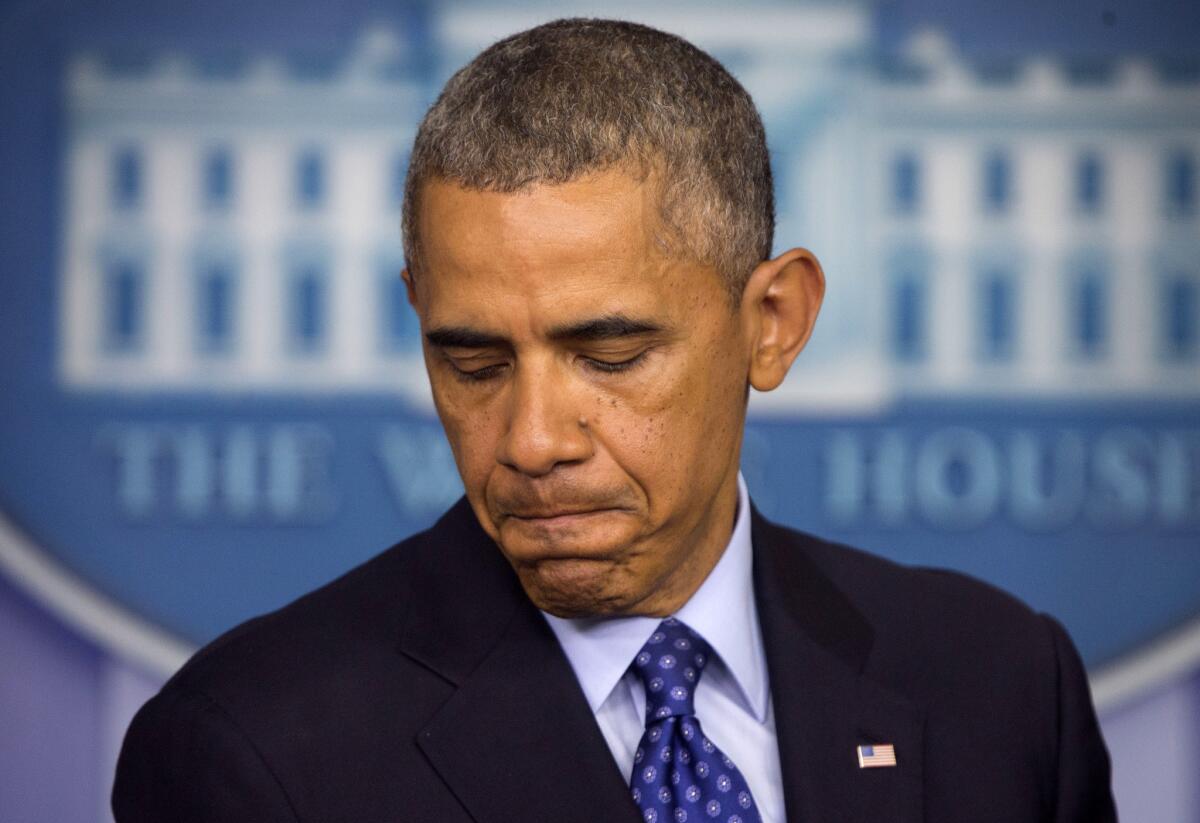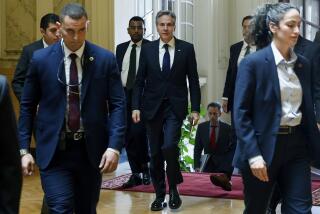Obama: U.S. cannot solve Iraq’s problems alone

The radical Sunni Muslim group advancing in Iraq, though it puts the Middle East’s stability at risk, is “just one of a number of organizations” in the region that pose a threat to U.S. interests, President Obama said Sunday.
Obama said the rapid advances by the Islamic State of Iraq and Syria, or ISIS, in Iraq could spill over into Jordan and that the group “could amass more arms, more resources” in Syria. But the president, likening ISIS to other groups such as Al Qaeda in Yemen, once again said it was not a problem that U.S. troops could solve.
“And this is going to be a global challenge and one that the United States is going to have to address, but we’re not going to be able to address it alone,” Obama said in an interview excerpt aired on CBS’ “Face the Nation.” “And as I said yesterday, what we can’t do is think that we’re just going to play whack-a-mole and send U.S. troops occupying various countries wherever these organizations pop up.”
The debate took place as ISIS fighters continued their rapid gains, capturing four more towns in western Iraq, and as Secretary of State John F. Kerry arrived in Cairo in part to try to find a solution to the escalating crisis. Obama has agreed to send as many as 300 U.S. special forces troops to Iraq as advisers, but has not yet committed to further action, such as airstrikes.
Obama said the extreme ideology of ISIS could prove its undoing.
“The thing about an organization like this is that typically when they control territory, because they’re so violent, because they’re so extreme, over time the local populations reject them,” he said. “We’ve seen that time and time again.”
Sen. Dianne Feinstein (D-Calif.), chairwoman of the Senate Intelligence Committee, said U.S. intelligence did not foresee the group’s rapid advance in Iraq.
“This is a different culture. It’s very difficult to pierce,” she said on CNN’s “State of the Union,” calling it “a real wake-up call for the United States.”
She said Obama is right to be “circumspect” but said that time is running out on a negotiated solution that could prevent Iraq from unraveling.
The dispute inside the Republican Party on intervention also continued on Sunday. Sen. Rand Paul (R-Ky.) said he thought the U.S. should avoid getting involved in a civil war between the “feckless” Iraqi government, allied with Iran, and militants allied with Al Qaeda.
“You have to ask yourself, are you willing to send your son, am I willing to send my son to retake back a city, Mosul, that they weren’t willing to defend themselves,” Paul said on “State of the Union.” “I’m not willing to send my son into that mess.”
Former Vice President Dick Cheney, a strong advocate for the 2003 Iraqi invasion during the Bush administration, on Sunday doubled down on his criticisms of Obama for not doing more in Iraq, in the Syrian civil war and the rest of the region.
“When we’re arguing over 300 advisers when the request had been for 20,000 in order to do the job right, I’m not sure we’ve really addressed the problem,” Cheney said on ABC’s “This Week.” He said the president has left a “vacuum” that is being filled by ISIS.
“The scope of the problem in part is based upon an unwillingness by the president to recognize that we have a problem,” he said. “They’re still living back in the day when they claimed, ‘We got Bin Laden, terrorism problem solved.’”
Asked about his own faulty predictions about an easy victory in Iraq, Cheney said, “If we spend our time debating what happened 11 or 12 years ago, we’re going to miss the threat that is growing and that we do face.”
Cheney did not call for any specific military actions. “I think at this point there are no good, easy answers in Iraq,” he said.
In his own appearance, Obama said the notion that he could have changed the outcome in Syria by doing more to arm rebels opposed to Syrian President Bashar Assad’s government is a “fantasy.”
“I think this notion that somehow there was this ready-made, moderate Syrian force that was able to defeat Assad is simply not true. … The notion that they were in a position suddenly to overturn, you know, not only Assad but also ruthless, highly trained jihadists if we just sent a few arms is a fantasy.”
Follow @jtanfani on Twitter
More to Read
Start your day right
Sign up for Essential California for news, features and recommendations from the L.A. Times and beyond in your inbox six days a week.
You may occasionally receive promotional content from the Los Angeles Times.







